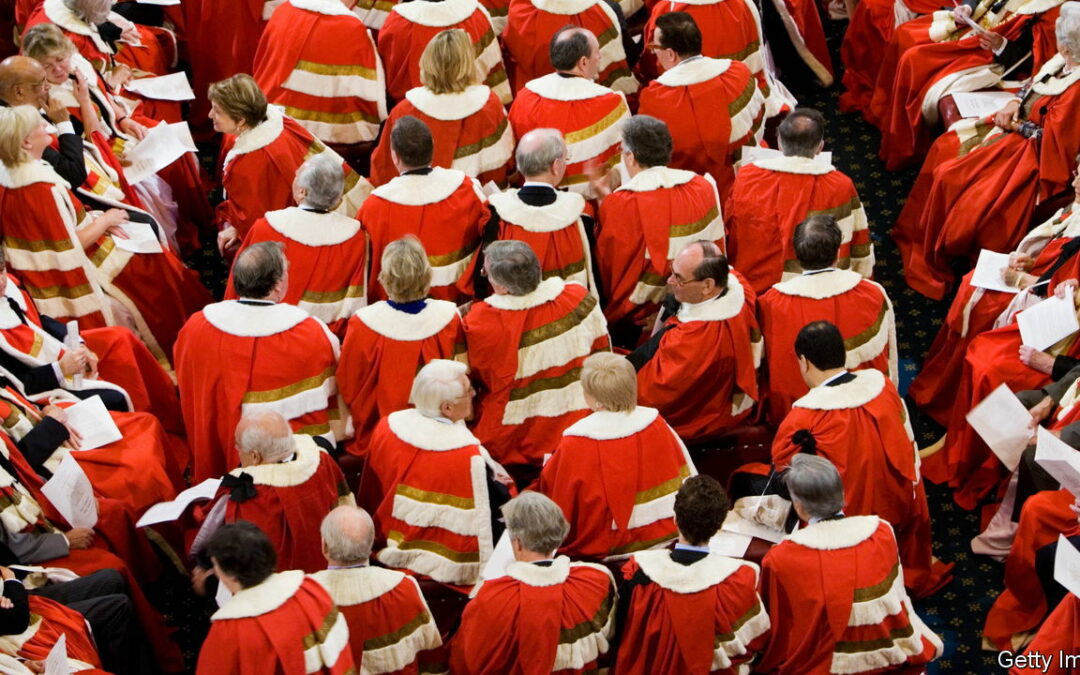ON JUNE 15TH the privileges committee of Britain’s House of Commons issued a long-awaited report on Boris Johnson, concluding that the former prime minister deliberately misled Parliament when he described illegal gatherings held at 10 Downing Street, his official residence, during covid-19 lockdowns. On June 9th Mr Johnson resigned as an MP, having seen an advance copy of the committee’s findings. But he had a parting gift. Just hours before he stood down, his resignation honours list was published.
As well as making his favourite Parliament hairdresser an Officer of the Most Excellent Order of the British Empire Mr Johnson nominated 16 peers to the House of Lords, Britain’s upper house. (One withdrew voluntarily.) But eight, including three Tory MPs, were found unsuitable by the House of Lords Appointments Commission (HOLAC), the Lords committee which vets, and advises the prime minister on, proposed members. That was an unusually high proportion of candidates not approved. The committee’s guidelines say that peers should be in “good standing” and have done nothing to bring the house into disrepute. MPs recommended for peerages were required to indicate to the committee that they would step down from the House of Commons within six months.
An almighty intra-Conservative spat broke out when Rishi Sunak, the prime minister, accused Mr Johnson of asking him to “overrule” HOLAC, a charge his former boss said was baseless. One of the three MPs who were denied peerages resigned; a second is threatening to follow suit. The chaos points to a perennially knotty question in British politics: just how do appointments to Britain’s upper house work?
The House of Lords is the second largest parliamentary assembly in the world—only China’s rubber-stamp National People’s Congress is larger. And unusually it has no limit on its number. It currently has 777 members, and more are added every year. Critics say it is stuffed to the ornate rafters with elderly men, many of whom prefer a good lunch, and a generous attendance allowance, to the hard graft of lawmaking. Its defenders argue that the Lords has a valuable role scrutinising legislation; like the Commons, it must approve all Acts of Parliament, and often introduces valuable amendments. Because of the ways members are appointed, the reality is somewhere in between.
Twenty-six are Church of England bishops known as the Lords Spiritual. The rest are the Lords Temporal, made up of “hereditary peers” and “life peers”. Hereditary peers are the remnants of the old order. For hundreds of years aristocratic men could take up a seat in the House of Lords and pass it on to their male heirs. In 1999 a Labour government limited the number of hereditary peerages to 92. Few earls, dukes or viscounts retire. When one dies, by-elections are held among other eligible gentry to replace him.
Life peers—including women—were introduced by a Conservative government in 1958. These include non-political “crossbench” members; each year, HOLAC recommends people it believes will bring expertise to the house. (In 2022 it selected Shaista Gohir, a women’s-rights campaigner, and Katherine Willis, a climate-change expert.)
But most life peers are political appointments, created through prime ministerial honours lists. British leaders are entitled to nominate people for honours, including peerages. They may do so each time they dissolve Parliament—as must happen before a general election—and when they resign, although not all have done so. They also put forward nominations on behalf of other political parties. There is no limit on the number of nominations prime ministers can make. Liz Truss, Britain’s shortest-serving prime minister who resigned in October, will reportedly, and belatedly, nominate four peers, roughly one for every ten days she was in office.
Appointments to the Lords are often controversial. Allies and donors may be rewarded with titles regardless of their merit as legislators. But the circumstances of Mr Johnson’s latest selection are especially divisive. The furore has revived calls for reform of the appointment of members. Sir Keir Starmer, the leader of the Labour opposition, has suggested replacing the Lords with an “Assembly of the Nations and Regions” of around 200 members. But he is not the first to propose sweeping reform to Britain’s upper house—if his party forms Britain’s next government, shaking up the Lords may seem less of a priority. ■









